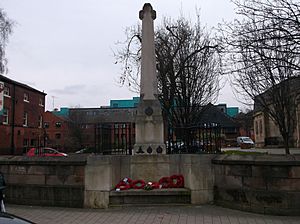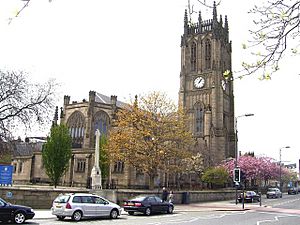Leeds Rifles War Memorial facts for kids
Quick facts for kids Leeds Rifles War Memorial |
|
|---|---|
| United Kingdom | |
 |
|
| For men of the Leeds Rifles killed in the First World War | |
| Unveiled | 13 November 1921 |
| Location | 53°47′43″N 1°32′08″W / 53.79532°N 1.53543°W |
| Designed by | Sir Edwin Lutyens |
|
Listed Building – Grade II
|
|
| Official name | North Boundary Wall and Steps, North West Gate and Piers, War Memorial and East Bar Stone |
| Designated | 8 May 1974 |
| Reference no. | 1375049 |
The Leeds Rifles War Memorial is a special monument in Leeds, West Yorkshire, England. It stands outside Leeds Minster, a big church on Kirkgate. This memorial was built to remember the brave soldiers of the Leeds Rifles who died in the First World War. Later, names from the Second World War were added too. A famous architect named Sir Edwin Lutyens designed it. He created many war memorials across Britain. This one was unveiled on Remembrance Sunday, November 13, 1921. Today, it is a protected historic building, known as a Grade II listed building.
Contents
Remembering Heroes
After the First World War, many memorials were built in Britain. This was because so many people had lost their lives. These memorials helped communities remember the soldiers who fought.
A Famous Architect
Sir Edwin Lutyens was a very important architect of his time. He designed many famous war memorials. One of his most well-known designs is The Cenotaph in London. This is where the main national Remembrance Sunday event happens each year. He also designed the Thiepval Memorial to the Missing in France.
The War Cross Design
Sir Edwin Lutyens created a special design for memorials called the "War Cross." The Leeds Rifles memorial is one of these crosses. It's unique because it was the only one ordered by a specific army regiment. Most of his War Cross designs were for towns and villages.
Memorial Design and History

The Leeds Rifles War Memorial is a smaller version of the War Cross. It is built into the wall of Leeds Minster. The memorial is made from Portland stone, which looks different from the church's sandstone. This contrast makes the memorial stand out.
Special Features
Because the ground level changes between the churchyard and the street, the memorial has a stone bench. This bench is also used as a platform for placing wreaths. Around the cross, there are decorative iron railings. These railings have pointed tops, called finials.
What the Memorial Says
The base of the cross has an inscription. It lists the different groups of the Leeds Rifles. These include the "7TH AND 8TH BATTALIONS / WEST YORKSHIRE REGIMENT / THE PRINCE OF WALES'S OWN / LEEDS RIFLES." It also mentions other regiments like the Royal Tank Regiment and Royal Artillery.
Above this, another inscription reads: "TO THE MEN OF THE LEEDS RIFLES WHO GAVE THEIR LIVES / 1914-1918 / 1939-1945." The dates for the Second World War were added later. You can also see bronze cap badges on the memorial. These are the symbols of the Leeds Rifles and other regiments they served with.
Unveiling the Memorial
The memorial was officially revealed on Remembrance Sunday, November 13, 1921. Captain George Sanders unveiled it. He was an officer from the Leeds Rifles who had won a Victoria Cross for his bravery during the war.
A Protected Landmark
On May 8, 1974, the Leeds Rifles War Memorial became a Grade II listed building. This means it is an important historic site that needs to be protected. In 2015, many of Sir Edwin Lutyens' war memorials were reviewed. They were recognized as a "national collection" because of their historical value.
 | Victor J. Glover |
 | Yvonne Cagle |
 | Jeanette Epps |
 | Bernard A. Harris Jr. |

